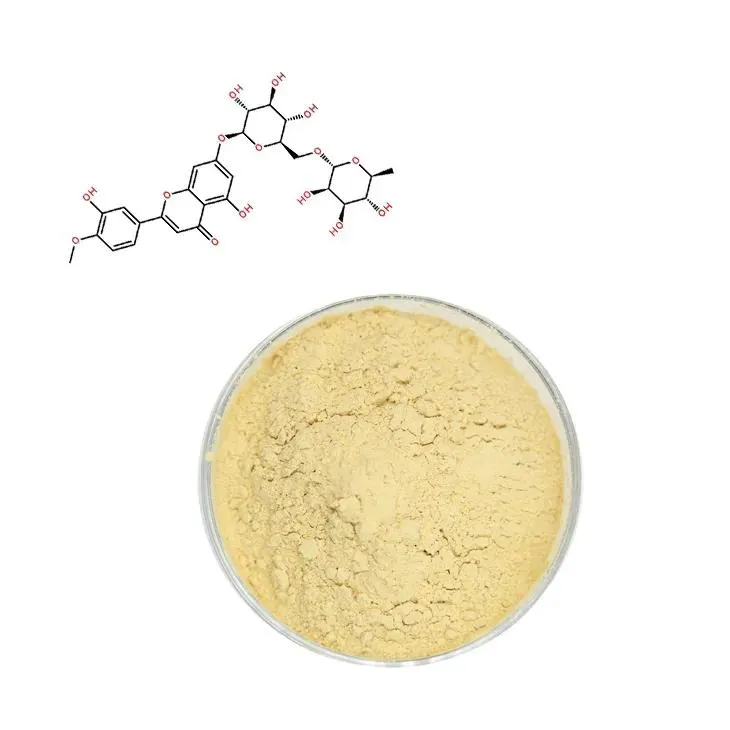- 0086-571-85302990
- sales@greenskybio.com
Diosmin: Known By Other Names and Its Health Benefits
2025-07-14

Diosmin is a naturally occurring flavonoid compound found predominantly in citrus fruits such as oranges and lemons. Over the years, Diosmin has gained recognition for its potential health benefits, particularly in promoting vascular health and managing various vascular-related conditions. While dioomin is the common name used in scientific literature and supplements, it also goes by several other names in both traditional and modern medicinal contexts. This article delves into alternative names for Diosmin and explores its health benefits and applications.
Alternative Names for Diosmin
Diosmin has been known by several names across different medical and nutritional contexts. These alternative names often reflect its natural sources or its usage in formulations. Some of the most common alternative names include:
1. Venocor
Venocor is a name often used in commercial products that contain diosmin as an active ingredient. This name reflects diosmin's primary application in promoting venous health and circulation.
2. Daflon
Daflon is not precisely another name for diosmin but a brand name for a formulation that combines diosmin with another flavonoid, Hesperidin. In Daflon, diosmin serves as a key active ingredient. This formulation is frequently used to treat venous insufficiency and hemorrhoids.
3. Bioflavonoid
Diosmin is sometimes referred to simplisticall as a "bioflavonoid" in dietary supplements and health products. Bioflavonoids are a class of polyphenolic compounds found in fruits and vegetables, known for their antioxidant and anti-inflammatory properties. While diosmin is only one of many bioflavonoids, this label signifies its place in this broad category.
4. Citrus Flavonoid
Since diosmin is sourced primarily from citrus fruits, it is sometimes labeled as a "citrus flavonoid" in supplements and food products. This name highlights its natural origin.
Understanding these alternative names is important for consumers and healthcare practitioners alike, as diosmin can be found in various products under different monikers.

Health Benefits and Applications of Diosmin
Diosmin offers a range of health benefits, largely attributed to its ability to support vascular health and improve circulation. Here's a closer look at its main benefits and applications:
1. Venous Insufficiency
Chronic venous insufficiency (CVI) occurs when veins, usually in the legs, are unable to return blood to the heart efficiently, leading to symptoms like swelling, pain, and varicose veins. Diosmin is widely used in the management of CVI due to its venotonic effects—meaning it improves the tone and function of veins. Diosmin works by reducing inflammation in the veins and increasing venous tone, thereby enhancing blood flow and reducing the symptoms associated with CVI.
2. Hemorrhoids
Hemorrhoids, also known as piles, are swollen blood vessels in the lower rectum and anus that can cause discomfort and bleeding. Diosmin has been shown to be effective in treating hemorrhoids, particularly in acute cases. Its anti-inflammatory properties help reduce swelling and improve vascular tone, offering relief from symptoms.
3. Lymphedema
Diosmin may be beneficial for individuals suffering from lymphedema, a condition characterized by localized fluid retention and tissue swelling due to a compromised lymphatic system. By improving microcirculation and capillary permeability, diosmin aids in reducing swelling and promoting fluid drainage in affected areas.
4. Antioxidant and Anti-inflammatory Properties
As a flavonoid, diosmin has potent antioxidant and anti-inflammatory effects. These properties help protect the body from oxidative stress and inflammation, which are underlying factors in many chronic diseases. By scavenging free radicals and reducing inflammatory responses, diosmin supports overall cellular health.
5. Additional Vascular Benefits
Diosmin’s ability to improve circulation extends beyond venous health. It may also help in managing conditions like varicose veins, leg ulcers, and even premenstrual syndrome (PMS) due to its general venoprotective qualities.
Safety and Side Effects
While diosmin is generally considered safe for most people when used appropriately, it is important to be aware of potential side effects and interactions. Common side effects include gastrointestinal discomfort, headaches, and skin irritation. These are typically mild and resolve once the body adapts to the supplement.
Before taking diosmin supplements, individuals should consult a healthcare provider, especially if they have existing health conditions or are taking other medications. Dosage recommendations can vary based on the specific formulation and intended use, so it is crucial to follow the guidance of a healthcare professional or the product label.
Conclusion: Recognizing Diosmin’s Versatility
Diosmin, though sometimes known under various alternative names, remains a powerful agent in promoting vascular health and alleviating symptoms associated with venous and circulatory disorders. Its versatility and efficacy in treating conditions such as chronic venous insufficiency and hemorrhoids highlight its importance in both modern medicine and dietary supplementation.
Understanding the myriad of names under which diosmin may be marketed — such as Venocor, Daflon, bioflavonoid, or citrus flavonoid — can guide consumers and healthcare practitioners in selecting the right product for specific health needs. As research continues to elucidate the full potential of this remarkable flavonoid, diosmin is likely to remain a staple in the management of vascular health.
- ▶ Hesperidin
- ▶ Citrus Bioflavonoids
- ▶ Plant Extract
- ▶ lycopene
- ▶ Diosmin
- ▶ Grape seed extract
- ▶ Sea buckthorn Juice Powder
- ▶ Fruit Juice Powder
- ▶ Hops Extract
- ▶ Artichoke Extract
- ▶ Mushroom extract
- ▶ Astaxanthin
- ▶ Green Tea Extract
- ▶ Curcumin
- ▶ Horse Chestnut Extract
- ▶ Other Product
- ▶ Boswellia Serrata Extract
- ▶ Resveratrol
- ▶ Marigold Extract
- ▶ Grape Leaf Extract
- ▶ New Product
- ▶ Aminolevulinic acid
- ▶ Cranberry Extract
- ▶ Red Yeast Rice
- ▶ Red Wine Extract
-
Horse Chestnut Extract
2025-07-14
-
Nutmeg Extract
2025-07-14
-
Carrageenan Extract Powder
2025-07-14
-
Lotus leaf extract
2025-07-14
-
Saffron Extract Powder
2025-07-14
-
Okra Extract
2025-07-14
-
Hedyotis Diffusa Extract
2025-07-14
-
Sea buckthorn Juice Powder
2025-07-14
-
White Peony Extract
2025-07-14
-
Aguaje Extract
2025-07-14





















